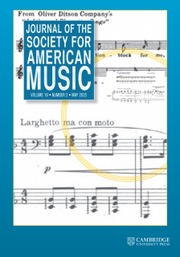Article contents
Ima Hogg and an Experiment in Audience Education: The Rice Lectureship in Music (1923–33)
Published online by Cambridge University Press: 13 July 2011
Abstract
During the 1920s, in a bid to elevate musical taste in Houston, Texas, arts patron Ima Hogg anonymously underwrote a series of public lectures on music at the Rice Institute, now Rice University. A trained musician who had spent considerable time in New York and Europe, Hogg recommended potential lecturers for the series, and her collaborator, the music-loving president of the Institute, Edgar Odell Lovett, worked to engage them. Not all of Hogg's candidates were available, and Lovett used his own contacts to supplement them. The resulting slate of lecturers was a diverse mix of musicians and scholars: Maurice Ravel, Arthur Honegger, Nadia Boulanger, John Powell, Harold Morris, George Birkhoff, and Henry Hadow. Their lectures survive in printed form in a scholarly journal published by Rice; they provide some of the most important statements about music by their authors. Hogg's patronage was made possible by an increase in her family's wealth, but her goal of public enlightenment was inspired by her family's tradition of public service (her father had been the governor of Texas) and by her longtime involvement in women's music clubs. Her model for the lectures may have been the didactic music club meeting; Lovett's was the university extension lecture directed toward a community audience. This article details and contextualizes Hogg's patronage in light of contemporary views of women's involvement in the support of music.
- Type
- Research Article
- Information
- Copyright
- Copyright © The Society for American Music 2011
References
- 1
- Cited by


